Juliet, Naked (2018)
Rose Byrne, Ethan Hawke, Chris O’Dowd, Megan Dodds. Written by Tamara Jenkins, Jim Taylor, Phil Alden Robinson, and Evgenia Peretz (based on the novel by Nick Hornby). Directed by Jesse Peretz.
 Tucker Crowe released one moderately successful album called Juliet and then disappeared. Decades later, his fans dedicate their free time to deconstructing the album and speculating on Crowe’s whereabouts in an online forum run by Duncan Thomson, a college lecturer in a small town in England. Duncan’s live-in girlfriend and the central character in Juliet, Naked is Annie Platt, the curator and director of the town’s museum.
Tucker Crowe released one moderately successful album called Juliet and then disappeared. Decades later, his fans dedicate their free time to deconstructing the album and speculating on Crowe’s whereabouts in an online forum run by Duncan Thomson, a college lecturer in a small town in England. Duncan’s live-in girlfriend and the central character in Juliet, Naked is Annie Platt, the curator and director of the town’s museum.
Juliet, Naked is the title of a new release of the classic album, but stripped down to its essential vocals and acoustic guitar, perhaps demo recordings of the songs before they were recorded and mixed for the final product. It seems to appear out of nowhere, and of course the rabid fanbase is ecstatic.

Annie is less so, and when she expresses her feelings about the album, she sets into motion a weird sequence of events leading to Annie’s serious questioning about her life choices. She knows exactly how she got to where she is, but is she satisfied? Is it too late for a redo on some of it?
It would be easy to call this film a romance, and there are romantic elements here. Yet Annie’s relationship with Duncan is only part of her reflection, merely representative of many choices she never pursued or opportunities she let go. The possibility of a new relationship simply provides the catalyst for this self-evaluation.

What I love most about Juliet, Naked besides Rose Byrne’s excellent performance is how correspondence by email and in text messages with an unexpected friend forces Annie to articulate the specifics of her life and how she feels about them. Annie deconstructs her relationship, her family, her job, and her small town in what becomes essentially a journal with an audience.
When Annie is finally ready to do or not do something about where she finds herself, it isn’t because some guy walks into her life, or some other guy sees the error of his ways and redeems himself. She makes her choices because self-examination empowers her.
 Ethan Hawke can be an annoying actor. I find myself demanding he prove his sincerity with every performance, even in those great sequels to Before Sunrise. Here is a film where he mostly wins me over (despite one suspiciously gratuitous piano performance), one of the best roles I’ve seen him in. Byrne has what I think of as the Emily Blunt role, which used to be the Minnie Driver role, but she does it in the sweetest, most relatable way that makes me wish she had more starring vehicles.
Ethan Hawke can be an annoying actor. I find myself demanding he prove his sincerity with every performance, even in those great sequels to Before Sunrise. Here is a film where he mostly wins me over (despite one suspiciously gratuitous piano performance), one of the best roles I’ve seen him in. Byrne has what I think of as the Emily Blunt role, which used to be the Minnie Driver role, but she does it in the sweetest, most relatable way that makes me wish she had more starring vehicles.
My only real problem with the movie is the Nick Hornby effect. I care about Annie and don’t want her mixed up with any of the men in Nick Hornby stories. Not John Cusack, not Hugh Grant, not Ethan Hawke, and certainly not Nick Hornby. None of these guys can be trusted, and I left the theater confident in Annie’s ability to deal with whatever comes her way, but I don’t want a Nick Hornby to be one of those things.
8/10
83/100

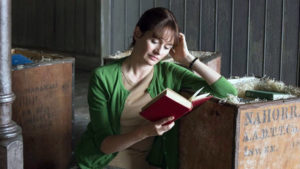 Florence Green is a middle-aged widow living in a very damp coastal English town. She opens a bookshop, despite reservations by (and condescending advice from) supposedly smarter men like her banker and her solicitor, and despite strong discouragement from Violet Gamart, an elder socialite who envisions a community arts center in the space Florence purchases for her shop.
Florence Green is a middle-aged widow living in a very damp coastal English town. She opens a bookshop, despite reservations by (and condescending advice from) supposedly smarter men like her banker and her solicitor, and despite strong discouragement from Violet Gamart, an elder socialite who envisions a community arts center in the space Florence purchases for her shop. A smart, young farm girl works for Florence after school, and the two ladies form a nice mentor-apprentice relationship. A wealthy recluse (played by Bill Nighy, one of my favorites) is one of her steadiest clients, and the bookshop seems to take hold in its little corner of this town among other residents as well, but Violet still wants her arts center.
A smart, young farm girl works for Florence after school, and the two ladies form a nice mentor-apprentice relationship. A wealthy recluse (played by Bill Nighy, one of my favorites) is one of her steadiest clients, and the bookshop seems to take hold in its little corner of this town among other residents as well, but Violet still wants her arts center. Riley North witnesses the horrible murder of her husband and young daughter. A crooked system lets the perpetrators get off with no punishment, so Riley disappears for a few years, showing up in time to commemorate the fifth anniversary of the murder, but this time with Jason-Bourne-like skills. And she’s not back to offer second chances.
Riley North witnesses the horrible murder of her husband and young daughter. A crooked system lets the perpetrators get off with no punishment, so Riley disappears for a few years, showing up in time to commemorate the fifth anniversary of the murder, but this time with Jason-Bourne-like skills. And she’s not back to offer second chances.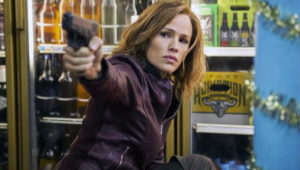 A movie like this is pretty much review-proof. It’s Jennifer Garner in badass mode, as she was in her Alias TV program. I was aware of its terrible reviews before I went in, but whatever. It’s Jennifer Garner.
A movie like this is pretty much review-proof. It’s Jennifer Garner in badass mode, as she was in her Alias TV program. I was aware of its terrible reviews before I went in, but whatever. It’s Jennifer Garner.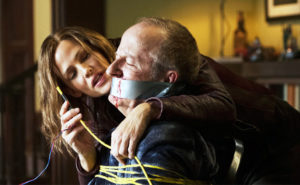 I dislike the concept of a vigilante, but I do enjoy vigilante movies, and how many have female leads? Seriously, you can put Riley right up there with any of them. I like her better than Charles Bronson in Death Wish or Clint Eastwood in those westerns. I don’t care that there is nary an explanation to be found for her quickly attained super-amazing death-machine skills. I just want more Peppermint.
I dislike the concept of a vigilante, but I do enjoy vigilante movies, and how many have female leads? Seriously, you can put Riley right up there with any of them. I like her better than Charles Bronson in Death Wish or Clint Eastwood in those westerns. I don’t care that there is nary an explanation to be found for her quickly attained super-amazing death-machine skills. I just want more Peppermint.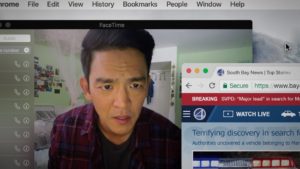 Searching is the second movie I’ve seen in September 2018 that’s marketed as a thriller but is really a mystery. So if you are not thrilled by thrillers (as I am not), don’t let the trailer keep you away. There are a couple of dark episodes, but the film stays away from edge-of-your-seat suspense or immediate peril for the main character. The main character’s teenaged daughter disappears and may be dead, and very sensitive parents may wish to skip it for this reason, but even with this major plot element, the film is really not at all scary.
Searching is the second movie I’ve seen in September 2018 that’s marketed as a thriller but is really a mystery. So if you are not thrilled by thrillers (as I am not), don’t let the trailer keep you away. There are a couple of dark episodes, but the film stays away from edge-of-your-seat suspense or immediate peril for the main character. The main character’s teenaged daughter disappears and may be dead, and very sensitive parents may wish to skip it for this reason, but even with this major plot element, the film is really not at all scary. Some viewers, however, may find it gimmicky. The entire movie is seen on electronic screens of some sort, usually computer screens and smartphone screens. Even when we’re looking at live news reports, we see them not on television, but via streaming through a web browser. There’s a good reason for the gimmick, and although this device forces the filmmakers to resort to some unrealistic exposition by way of news reporters who say things they would never say (and televise things they would never televise), it’s worth this bit of tradeoff for the social issues they explore. In this way, Searching is not a bad partner for Eighth Grade.
Some viewers, however, may find it gimmicky. The entire movie is seen on electronic screens of some sort, usually computer screens and smartphone screens. Even when we’re looking at live news reports, we see them not on television, but via streaming through a web browser. There’s a good reason for the gimmick, and although this device forces the filmmakers to resort to some unrealistic exposition by way of news reporters who say things they would never say (and televise things they would never televise), it’s worth this bit of tradeoff for the social issues they explore. In this way, Searching is not a bad partner for Eighth Grade.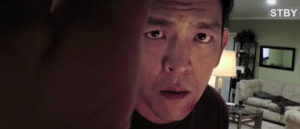 Cho is David Kim, the recently widowed father of Margot, a high-achieving high-school senior. Margot disappears one night when she’s supposed to be at a study group. As police detective Rosemary Vick (Debra Messing) and her team trace the evidence, they ask David to contact all of Margot’s friends to try and figure out where she might have gone. The more David looks, the clearer it is that he really doesn’t know his daughter.
Cho is David Kim, the recently widowed father of Margot, a high-achieving high-school senior. Margot disappears one night when she’s supposed to be at a study group. As police detective Rosemary Vick (Debra Messing) and her team trace the evidence, they ask David to contact all of Margot’s friends to try and figure out where she might have gone. The more David looks, the clearer it is that he really doesn’t know his daughter. A Simple Favor is being marketed as a thriller, but it’s really more of a mystery, so if you’re put off by thrillers (as I am), be assured that it’s not very scary and not very violent, and it doesn’t have edge-of-your-seat moments the way thrillers usually do.
A Simple Favor is being marketed as a thriller, but it’s really more of a mystery, so if you’re put off by thrillers (as I am), be assured that it’s not very scary and not very violent, and it doesn’t have edge-of-your-seat moments the way thrillers usually do.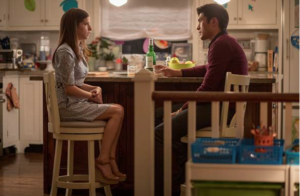 She meets Emily, the beautiful mother of her son’s classmate. Stephanie and Emily become friends, but for Stephanie it’s a very uneasy friendship. Emily is wealthier, more successful, and more adventurous than she is, and where Stephanie is eager to please and quick to apologize, Emily seems to disdain any attitude that doesn’t begin with oneself. She admonishes Stephanie for saying “I’m sorry,” and threatens to punch her in the face if Stephanie ever says it again.
She meets Emily, the beautiful mother of her son’s classmate. Stephanie and Emily become friends, but for Stephanie it’s a very uneasy friendship. Emily is wealthier, more successful, and more adventurous than she is, and where Stephanie is eager to please and quick to apologize, Emily seems to disdain any attitude that doesn’t begin with oneself. She admonishes Stephanie for saying “I’m sorry,” and threatens to punch her in the face if Stephanie ever says it again. It’s fun in the way a good puzzle mystery is fun, engaging all the way and difficult to predict. Every character seems at times likeable and despicable, with nice performances by Kendrick, Lively, and Henry Golding as Sean, Stephanie’s husband.
It’s fun in the way a good puzzle mystery is fun, engaging all the way and difficult to predict. Every character seems at times likeable and despicable, with nice performances by Kendrick, Lively, and Henry Golding as Sean, Stephanie’s husband. It would take longer to describe the plot of Blindspotting than I want to take, and anything I’d write might fail to convince you to see this movie, which is what I really want. The writers (who also star) try to do a lot with this story, most of it successfully, but the accomplishment isn’t in the story; it’s in the development of these characters toward a face-off over issues so layered that it takes all these plot elements to get us ready for it.
It would take longer to describe the plot of Blindspotting than I want to take, and anything I’d write might fail to convince you to see this movie, which is what I really want. The writers (who also star) try to do a lot with this story, most of it successfully, but the accomplishment isn’t in the story; it’s in the development of these characters toward a face-off over issues so layered that it takes all these plot elements to get us ready for it. Daveed Diggs plays Collin, a late-20s black man living in a halfway house. He has three days left on his probation after a prison sentence. For three days, he must stay completely out of trouble, but there are pitfalls all over the place in his hometown of Oakland. It’s tempting to think forces are amping up their game against him in these three days, but one gets the feeling after getting to know this man that it’s not these three days: it’s every day that a black man trying to stay clear must dodge problems.
Daveed Diggs plays Collin, a late-20s black man living in a halfway house. He has three days left on his probation after a prison sentence. For three days, he must stay completely out of trouble, but there are pitfalls all over the place in his hometown of Oakland. It’s tempting to think forces are amping up their game against him in these three days, but one gets the feeling after getting to know this man that it’s not these three days: it’s every day that a black man trying to stay clear must dodge problems. Collin’s best friend since childhood is Miles, a white man who seems to think it necessary to prove in every waking moment that he’s as street as any of the black men and women he’s friends with. Miles doesn’t just walk the line; he takes daily steps over it, I guess because he can.
Collin’s best friend since childhood is Miles, a white man who seems to think it necessary to prove in every waking moment that he’s as street as any of the black men and women he’s friends with. Miles doesn’t just walk the line; he takes daily steps over it, I guess because he can. Blindspotting has a lot to say, and it brilliantly says most of it through the lives of these characters. This is when it works. Sometimes it says it through the mouths of the characters, almost in Greek chorus-like fashion, and here is where it doesn’t quite work. I suspect there’s a cultural barrier here for me, as the characters repeatedly break out into spoken-word, freestyle verse of the sort that some call slam poetry. When it’s playful it’s cute and clever. When it’s dramatic, I have difficulty taking it seriously. And while I admire the device for its vision, creativity, and daring, it doesn’t quite click things into place the way it wants.
Blindspotting has a lot to say, and it brilliantly says most of it through the lives of these characters. This is when it works. Sometimes it says it through the mouths of the characters, almost in Greek chorus-like fashion, and here is where it doesn’t quite work. I suspect there’s a cultural barrier here for me, as the characters repeatedly break out into spoken-word, freestyle verse of the sort that some call slam poetry. When it’s playful it’s cute and clever. When it’s dramatic, I have difficulty taking it seriously. And while I admire the device for its vision, creativity, and daring, it doesn’t quite click things into place the way it wants. Mr. Rogers shows a short film on his in-studio framed painting, whose name is Picture Picture. Mr. Rogers challenges us to guess what’s being produced in this film. We see machines leading yarn around and around through a maze of mechanical arms, spools, and belts. Something’s taking shape but it’s impossible to tell what it is. Suddenly the process is complete, and we’ve witnessed the automated production of socks.
Mr. Rogers shows a short film on his in-studio framed painting, whose name is Picture Picture. Mr. Rogers challenges us to guess what’s being produced in this film. We see machines leading yarn around and around through a maze of mechanical arms, spools, and belts. Something’s taking shape but it’s impossible to tell what it is. Suddenly the process is complete, and we’ve witnessed the automated production of socks.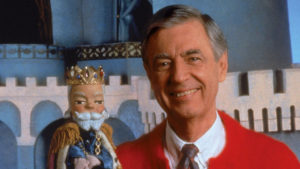 Mr. Rogers has a leaky wooden bucket. He takes us to the house of a neighbor who’s a woodworker. She repairs the bucket. I’m not sure, but I think she does it without glue or any kind of adhesive. Before Mr. Rogers leaves, he thanks his friend and says, “This is water-tight, right?” And the neighor says, “This should be water-tight.” Mr. Rogers takes the bucket back to his place and puts water in the bucket. It’s water-tight, and I’ve learned a new phrase at five years old.
Mr. Rogers has a leaky wooden bucket. He takes us to the house of a neighbor who’s a woodworker. She repairs the bucket. I’m not sure, but I think she does it without glue or any kind of adhesive. Before Mr. Rogers leaves, he thanks his friend and says, “This is water-tight, right?” And the neighor says, “This should be water-tight.” Mr. Rogers takes the bucket back to his place and puts water in the bucket. It’s water-tight, and I’ve learned a new phrase at five years old.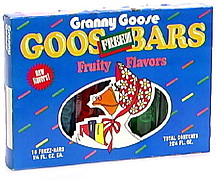 I have some kind of boo-boo, something bad enough to make me cry. My family is living on Treasure Island in San Francisco Bay. My dad is at work; I don’t know where my sister is. My mom puts a Band-Aid on it, or kisses it, or does some kind of mom magic that makes me feel better. Then she gives me a Granny Goose Goos-Bar (it was our family’s preferred brand; I don’t remember having Otter Pops until I was almost out of elementary school, at some kind of school function) and puts me in front of the TV to watch Mr. Rogers.
I have some kind of boo-boo, something bad enough to make me cry. My family is living on Treasure Island in San Francisco Bay. My dad is at work; I don’t know where my sister is. My mom puts a Band-Aid on it, or kisses it, or does some kind of mom magic that makes me feel better. Then she gives me a Granny Goose Goos-Bar (it was our family’s preferred brand; I don’t remember having Otter Pops until I was almost out of elementary school, at some kind of school function) and puts me in front of the TV to watch Mr. Rogers.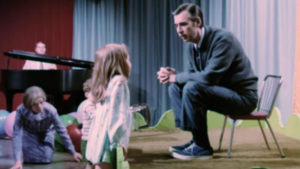 The kids in first and second grade liked Sesame Street. I liked Mr. Rogers. Still. None of the guys liked Mr. Rogers at all. Some of them said Mr. Rogers was gay. None of this was enough to make me change my mind. All of this is part of my first memory of being alienated from the other guys by liking something different, a state that never really went away.
The kids in first and second grade liked Sesame Street. I liked Mr. Rogers. Still. None of the guys liked Mr. Rogers at all. Some of them said Mr. Rogers was gay. None of this was enough to make me change my mind. All of this is part of my first memory of being alienated from the other guys by liking something different, a state that never really went away. It’s a bit more trendy now to remember Mr. Rogers with fondness, and I want to feel good about it, but mostly I feel slightly resentful. I knew Mr. Rogers was awesome when I was three. Where were all these fans at seven and eight? I don’t need them now; I needed them then.
It’s a bit more trendy now to remember Mr. Rogers with fondness, and I want to feel good about it, but mostly I feel slightly resentful. I knew Mr. Rogers was awesome when I was three. Where were all these fans at seven and eight? I don’t need them now; I needed them then.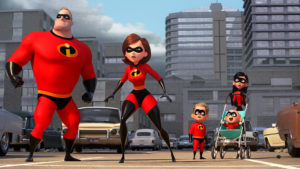 Although I am a deep admirer of Pixar Studios and its amazing work, I didn’t love The Incredibles in 2004, even acknowledging that the characters were well imagined and the story pretty creative. Breakneck action just doesn’t do much for me most of the time, and even at its most creative, my brain can only handle so much before it starts counting down the minutes until the end credits, which was my experience with the new sequel, Incredibles 2.
Although I am a deep admirer of Pixar Studios and its amazing work, I didn’t love The Incredibles in 2004, even acknowledging that the characters were well imagined and the story pretty creative. Breakneck action just doesn’t do much for me most of the time, and even at its most creative, my brain can only handle so much before it starts counting down the minutes until the end credits, which was my experience with the new sequel, Incredibles 2. I’m not complaining about too much action in an action movie any more than I’d complain about too much chocolate in a chocolate cake. I’m just noting that however good the action is, it turns me off after a point. Just like a too-chocolately chocolate cake.
I’m not complaining about too much action in an action movie any more than I’d complain about too much chocolate in a chocolate cake. I’m just noting that however good the action is, it turns me off after a point. Just like a too-chocolately chocolate cake.

 It’s been thirty years since Christopher Robin last visited the Hundred Acre Wood, and he is sorely missed by its denizens. He’s a man now, with a career as an efficiency manager for a luggage company in post-WWII London. He has a wife and a daughter, and if he ever thinks of his friends Pooh and Piglet, you wouldn’t be able to tell.
It’s been thirty years since Christopher Robin last visited the Hundred Acre Wood, and he is sorely missed by its denizens. He’s a man now, with a career as an efficiency manager for a luggage company in post-WWII London. He has a wife and a daughter, and if he ever thinks of his friends Pooh and Piglet, you wouldn’t be able to tell. Since Christopher Robin will not visit the Hundred Acre Wood, which has always been there for him, Winnie-the-Pooh comes looking for Christopher Robin, stumbling into London through the door where they used to meet.
Since Christopher Robin will not visit the Hundred Acre Wood, which has always been there for him, Winnie-the-Pooh comes looking for Christopher Robin, stumbling into London through the door where they used to meet. Ewan McGregor is perfectly cast as middle-aged Christopher Robin, reminding me at times of his wonderful Alfred Jones character in Salmon Fishing in the Yemen, only not as funny. Brad Garrett seems like a no-brainer to voice Eeyore (my favorite), but he’s kind of distractingly recognizable as Brad Garrett most of the time. Young people will probably not have this issue, as Everybody Loves Raymond has been off the air for thirteen years.
Ewan McGregor is perfectly cast as middle-aged Christopher Robin, reminding me at times of his wonderful Alfred Jones character in Salmon Fishing in the Yemen, only not as funny. Brad Garrett seems like a no-brainer to voice Eeyore (my favorite), but he’s kind of distractingly recognizable as Brad Garrett most of the time. Young people will probably not have this issue, as Everybody Loves Raymond has been off the air for thirteen years. Another excellent decision was to represent the animal characters based on the original drawings by E. H. Shepard in the books, rather than on the Disney cartoons that have replaced them in many of our minds. However the animators managed to put these characters on the screen, the animals seem pretty real to me throughout the film, in both their and Christopher Robin’s realities. Which is rather perfect.
Another excellent decision was to represent the animal characters based on the original drawings by E. H. Shepard in the books, rather than on the Disney cartoons that have replaced them in many of our minds. However the animators managed to put these characters on the screen, the animals seem pretty real to me throughout the film, in both their and Christopher Robin’s realities. Which is rather perfect. Although I admit I found most of the third act disappointing, I cannot deny the emotional effect the very existence of this film had on me, an enormous fan of the books by A. A. Milne. I did not have these books read to me as a child, and I came to them rather late, beginning in sixth grade and finishing in seventh. I don’t know what drew me to them then, but I hold tightly to them today for their utter lack of cynicism, for their pureness of spirit, and for their steadfast belief in the virtues of kindness, curiosity, imagination, and the specialness of certain relationships.
Although I admit I found most of the third act disappointing, I cannot deny the emotional effect the very existence of this film had on me, an enormous fan of the books by A. A. Milne. I did not have these books read to me as a child, and I came to them rather late, beginning in sixth grade and finishing in seventh. I don’t know what drew me to them then, but I hold tightly to them today for their utter lack of cynicism, for their pureness of spirit, and for their steadfast belief in the virtues of kindness, curiosity, imagination, and the specialness of certain relationships.
 Four women who’ve been friends since college have now been a book club for more than thirty years. Diane Keaton, Jane Fonda, Mary Steenburgen, and Candice Bergen play Diane, Vivian, Carol, and Sharon.
Four women who’ve been friends since college have now been a book club for more than thirty years. Diane Keaton, Jane Fonda, Mary Steenburgen, and Candice Bergen play Diane, Vivian, Carol, and Sharon. Vivian is a builder and owner of hotels, apparently a self-made business success who doesn’t let relationships with men get too serious because they interfere with her independence.
Vivian is a builder and owner of hotels, apparently a self-made business success who doesn’t let relationships with men get too serious because they interfere with her independence. At one of the book club meetings one of the women passes around copies of 50 Shades of Grey, which draws complaints and derision from the group, but “bestsellers” is the club’s theme this year, and so they give it a go. The novel inspires them to make a few changes to their love lives, each in her own way.
At one of the book club meetings one of the women passes around copies of 50 Shades of Grey, which draws complaints and derision from the group, but “bestsellers” is the club’s theme this year, and so they give it a go. The novel inspires them to make a few changes to their love lives, each in her own way. I was frustrated with Diane Keaton’s character Diane, because she’s forced to play a character who’s nonassertive around her adult kids, a mode that doesn’t suit the actress well at all. It isn’t until nearly the end of the film where we see Keaton shine as an actress. I wished her story could have begun right there.
I was frustrated with Diane Keaton’s character Diane, because she’s forced to play a character who’s nonassertive around her adult kids, a mode that doesn’t suit the actress well at all. It isn’t until nearly the end of the film where we see Keaton shine as an actress. I wished her story could have begun right there.